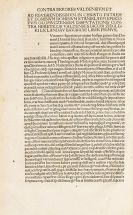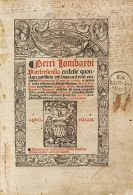
Martin Schongauer
Colmar
1450 -
Breisach
1491
The son of a goldsmith, Martin Schongauer was born in Colmar ca 1450. He spent his early apprenticeship years in his father's workshop, where he learned both drawing and engraving. He is first mentioned in records in 1465, when he enrolled at Leipzig University. He may then have embarked on an apprenticeship under the Colmar painter Caspar Isenmann, who was strongly influenced by Flemish painting.
About 1469 Schongauer set out on his journeyman's travels, going to Burgundy and the Netherlands. His early copperplates reveal the direct translation of pictorial types from the painting of Rogier van der Weyden, Dieric Bouts and Jan van Eyck. In 1470-71 Martin Schongauer was again in Colmar. He must have been successful because there are several mentions of him in records as owning a house. In 1473 Schongauer painted the "Madonna im Rosenhag" for St Martin's in Colmar, his only panel painting with a verified date. In 1489 Schongauer embarked on a cycle of wall paintings in Breisach Minster and was still working on them when he died, probably of plague, in 1491.
Martin Schongauer's tremendous importance lies in his comprehensive œuvre of copperplates, comprising approx. one hundred and sixteen prints, which are among the greatest of their kind in the history of Western graphic art.
Schongauer was among the first artists to number his sheets consecutively, print them in large editions and ensure that they were given widespread commercial circulation in Europe. The subject matter is occasionally profane but most are New Testament scenes and scenes drawn from the Saints' lives. Schongauer's work is distinguished by exceptional clarity of composition and handling of space while the emotions of the figures form the core of the statements made.
Art is indebted to Schongauer for cross-hatching, which makes it possible to produce particularly sculptural effects. Needless to say, Martin Schongauer exerted an enormous influence on the art of his day. His contemporaries attested to this by playing on his name to call him "Martin schoen", "hibsch Martin" or "Bel Martino". His works were copied and imitated, sometimes even with his monogram. According to the art chronicler Giorgio Vasari, Martin Schongauer was also highly esteemed in Italy; the great Michelangelo even copied Schongauer's "Temptation of St Antony".
Albrecht Dürer went as a young man to Breisach in 1492 to make Schongauer's acquaintance but met only his brother, who handed over drawings by the master to the aspiring artist. Today about forty drawings of Martin Schongauer's are known. He was also of exceptional importance as a painter. Only a few works have been verified as from Schongauer's hand. A few small panel paintings are extant in addition to the "Virgin of the Rosebush", the altarpiece wings executed for the Antonite Monastery at Isenheim, the former high altar of the Dominican church in Colmar and the above mentioned wall paintings.
Would you like to sell a work by Martin Schongauer?
Infos for seller






